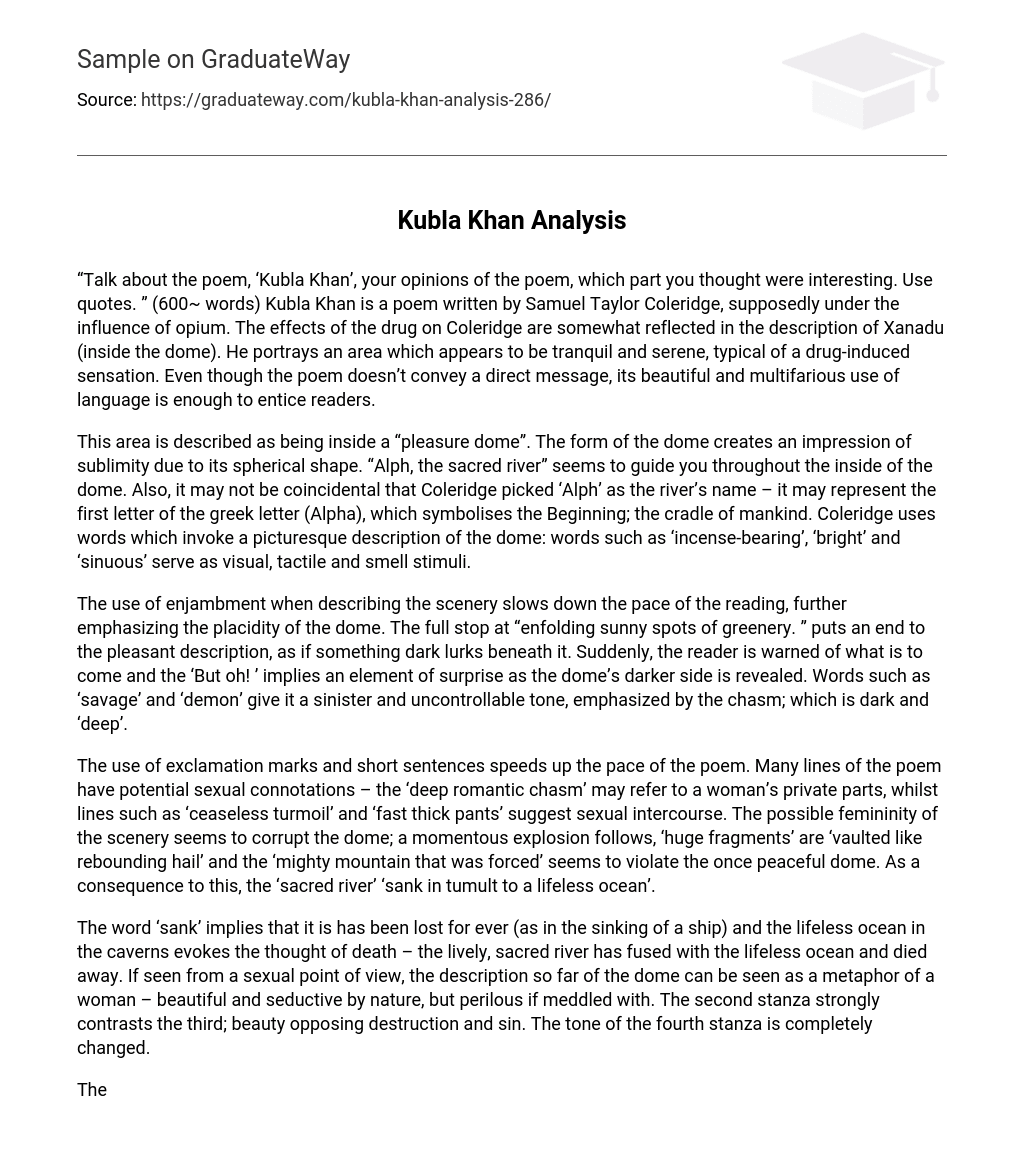“Talk about the poem, ‘Kubla Khan’, your opinions of the poem, which part you thought were interesting. Use quotes. ” (600~ words) Kubla Khan is a poem written by Samuel Taylor Coleridge, supposedly under the influence of opium. The effects of the drug on Coleridge are somewhat reflected in the description of Xanadu (inside the dome). He portrays an area which appears to be tranquil and serene, typical of a drug-induced sensation. Even though the poem doesn’t convey a direct message, its beautiful and multifarious use of language is enough to entice readers.
This area is described as being inside a “pleasure dome”. The form of the dome creates an impression of sublimity due to its spherical shape. “Alph, the sacred river” seems to guide you throughout the inside of the dome. Also, it may not be coincidental that Coleridge picked ‘Alph’ as the river’s name – it may represent the first letter of the greek letter (Alpha), which symbolises the Beginning; the cradle of mankind. Coleridge uses words which invoke a picturesque description of the dome: words such as ‘incense-bearing’, ‘bright’ and ‘sinuous’ serve as visual, tactile and smell stimuli.
The use of enjambment when describing the scenery slows down the pace of the reading, further emphasizing the placidity of the dome. The full stop at “enfolding sunny spots of greenery. ” puts an end to the pleasant description, as if something dark lurks beneath it. Suddenly, the reader is warned of what is to come and the ‘But oh! ’ implies an element of surprise as the dome’s darker side is revealed. Words such as ‘savage’ and ‘demon’ give it a sinister and uncontrollable tone, emphasized by the chasm; which is dark and ‘deep’.
The use of exclamation marks and short sentences speeds up the pace of the poem. Many lines of the poem have potential sexual connotations – the ‘deep romantic chasm’ may refer to a woman’s private parts, whilst lines such as ‘ceaseless turmoil’ and ‘fast thick pants’ suggest sexual intercourse. The possible femininity of the scenery seems to corrupt the dome; a momentous explosion follows, ‘huge fragments’ are ‘vaulted like rebounding hail’ and the ‘mighty mountain that was forced’ seems to violate the once peaceful dome. As a consequence to this, the ‘sacred river’ ‘sank in tumult to a lifeless ocean’.
The word ‘sank’ implies that it is has been lost for ever (as in the sinking of a ship) and the lifeless ocean in the caverns evokes the thought of death – the lively, sacred river has fused with the lifeless ocean and died away. If seen from a sexual point of view, the description so far of the dome can be seen as a metaphor of a woman – beautiful and seductive by nature, but perilous if meddled with. The second stanza strongly contrasts the third; beauty opposing destruction and sin. The tone of the fourth stanza is completely changed.
The reference to the ‘shadow of the dome of pleasure’, used immediately at the beginning of the fourth stanza implies that the dome’s beauty is no longer what it was; it’s now only a shadow of its former self. Coleridge constantly creates a contrast between the sun and darkness. In this case, a ‘sunny pleasure-dome with caves of ice’ may once again refer to the woman; as if she were warm and seductive on the outside, yet treacherous and icy on the inside. Coleridge then sets aside Kubla Khan’s story and introduces himself and his story with the use of the pronoun ‘I’.
He mentions an ‘Abyssinian maid’ who played her ‘dulcimer’. The place of origin of the maid; Abyssinia, can be seen as ambiguous as it may or may not be a subtle suggestion to the word ‘abyss’, which would then relate to the ‘chasm’ and ‘caves measureless to man’ as even further reference to women as perfidious beings – which contrasts with the potential angelic properties of the dulcimer (similar to harps played by angels)(N. B. probably a coincidence, but ‘dulcimer’ sounds like ‘dulce’ which means ‘sweet’, which would further emphasize the heavenly effect of this specific choice for an instrument).
Furthermore, the mention of Abyssinia (which was in Africa) suggests that the maid might be Eve and the dome Paradise, as Paradise was ‘supposedly’ somewhere in Africa (according to Catholics). This would also justify Coleridge’s (possible) suggestion of women as being treacherous by nature, as Eve picked the Forbidden Fruit from the Tree of Knowledge. Coleridge then states that the ‘deep delight’ induced by her heavenly music would inspire him to ‘build that dome in air’. This seems to mirror he popular conception of Creation – God conceives our planet (same spherical shape as the dome) whilst the angels play their heavenly music. ‘His flashing eyes, his floating hair! ’ creates the impression of a strong light, typical in heavenly/ethereal being, yet the cries of ‘Beware! Beware! ’ might suggest a nefarious/demonic being instead. ‘Weave a circle round him thrice’ suggests a form of ritual to try to rid him of his curse. ‘And close your eyes with holy dread’: this seems to imply that he has been in fact cursed, and that the virtuous people shouldn’t see the form of evil. For he on honey-dew hath fed […] and drunk the milk of paradise’ seems like a euphemism for the sexual intercourse he had with the woman and once again shows Coleridge’s attitude towards women: having condescended to sex with the woman has made him unholy and a sinner. The poem’s multifaceted tones, scenes and the lack of an unambiguous message allow readers to delve into the richness of Colaridge’s poem and weave their own interpretation of the poem. Also, the fact that Coleridge introduces himself so close to the end of the poem may be grounds for suggesting that his poem is, in fact, unfinished.





